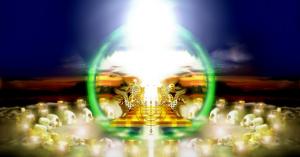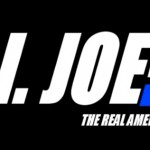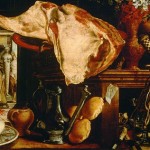 Matthew 14:13-21
Matthew 14:13-21
Do you ever find yourself doing some of the most important things in life as if you’re just going through the motions? Sometimes the most important things in life have become so common that we stop noticing them. For example, most of the time we don’t notice that we breathe to take in the oxygen that helps support our life.
And sometimes our daily need to eat food can go unnoticed; after all, every year you live you probably eat more than 1000 meals.
And yet when you think about it, the fact that we stuff things in our mouths, and swallow them and make them part of us is a pretty amazing thing!
Throughout the Bible, food is important.
The fall of mankind, in which sin entered into the world, all came about over the issue of food. How would man sustain himself – by his hand, or by the hand of God?
In one verse taken from this morning’s lesson, Matthew 14:19, we see the entire gospel, the good news of Jesus Christ, encapsulated: “And He took the five loaves and the two fish, and looking up to heaven, He blessed and broke and gave the loaves to the disciples; and the disciples gave to the multitudes.”
In this verse, through the medium of earthly bread, Jesus Christ brings us the Good News of salvation.
Matthew 14:19 begins with one of the most basic facts of our existence: human hunger. Men are hungry. They need food to live, and yet there is not enough food where the 5000 are to feed everyone. The hunger of the 5000 represents all human need, especially our need for salvation. Our physical hunger reminds us about an even deeper hunger that we all have felt in this life, just as the goodness of food is to remind us of the goodness of God.
What will Jesus do about the hunger of the 5000? He took bread, the most basic food, and from this, He fed the many. He used, as He does so commonly in our lives, the ordinary in His miracles. He speaks to us and He feeds us through His creation. This is the sacramental principle in the world by which God takes the ordinary things He has created and blesses them so that they become blessings to us – the very means by which He gives Himself to us. Sometimes food is not just food.
What will God do about the spiritual hunger of human’s? What God does in response to our spiritual hunger and need is The Incarnation. The Lord of Creation became part of Creation. He saw our need, He takes the Creation in His hands that He might bless it, and He blesses us through it. He takes man, who has profaned himself, becomes a man, and then blesses this Man that through Him all might be blessed.
But the Creation is never sufficient by itself. It’s limited, and it’s fallen. There was not enough bread or fish to feed everyone. In the story of our lives, man cannot take care of himself.
Therefore, Jesus takes the bread and thanks God for it, or blesses it. He takes the bread and transforms it, in this case into more bread. The result is that people are fed. There is no more hunger, and there is even more than enough.
And like the few loaves of bread, we are never sufficient to take care of our deepest needs. And so God takes human nature and transforms it: He became the Creation. The Incarnation is God’s greatest miracle: God becomes man that He might save man.
Jesus gave the physical bread He had blessed and multiplied to His disciples first. The bread that Jesus provides must now be given, to feed the hungry. How good that bread must have tasted! I don’t know if any of you have ever participated in a total fast for some time, but it’s amazing when you begin eating again how good simple, store-bought, preservative-ridden, bread smells and tastes!
Jesus also gives the Bread of Life, Himself, to His disciples first. He taught the disciples first and gave Himself to them first, and then they go and feed the others who are hungry.
We, too, are His disciples, and God has fed us. But He doesn’t feed us automatically: we’re not comatose on a hospital bed, hooked up to an IV and catheter. We must pray for and eat our daily bread when He offers it to us. Jesus’ miracle of feeding the 5000 was to teach us. He did that miracle one time for those people.
But the greater miracle is that this miracle keeps multiplying, and through it God continues to feed His people and has been for 2000 years. As we read the Word of God, which we are doing today together, we must feed on the heavenly bread, Jesus Himself. That’s the sacramental teaching we are to receive today.
We eat physical food 3 times a day (or 4 or 5 or 6 if you count snacks!) Shouldn’t we seek our daily spiritual bread at least as often as this? Shouldn’t we relish our times of worship and prayer and meditating on God’s Word at least as much as we do our breakfasts and lunches? And doesn’t this heavenly bread taste wonderful, especially if we’ve been fasting from it!
We’ve trained ourselves to be connoisseurs of food. We know fine wines, and have tasted deeply. Why not become connoisseurs of God, who is our heavenly food, so that truly we “Taste and see that the Lord is good.”
After eating and being filled, the disciples give the bread to the others who had come. After being taught, the disciples are supposed to distribute the Bread of Life, Jesus Himself, to all who will come. That’s our commission, as it was the disciples here and at the end of Matthew in the Great Commission. We also must be disciples who go out and make disciples so that life begets life.
We must not only keep this holy food for ourselves but also bring it to all who we meet who are spiritually hungry – and that includes everyone you meet.
The Feeding of the 5000 is a picture how Jesus Christ gives Himself as the Bread of Life: it is the Gospel of Bread.
It would be easy to be fed this morning once, digest the spiritual food, and then that’s it. Why not take every opportunity to see the physical food God gives you as a reminder of His goodness to you? The best reminder of all, of course, is the spiritual food of the Body and Blood of Jesus Christ that He offers in His Supper.
“And He took the five loaves and the two fish, and looking up to heaven, He blessed and broke and gave the loaves to the disciples; and the disciples gave to the multitudes.”
This is the story of our lives: this is the Gospel of Bread.
Prayer: Almighty and everliving God, we most heartily thank You, because You feed us through the Bread of Heaven, Your Son, Jesus Christ our Lord; and You assure us through Him of Your favor and goodness towards us. We humbly ask that, having been fed by You, we would go and feed others in Your Name. Through Jesus Christ, who is the Bread of Heaven. Amen.
Points for Meditation:
- What are the various ways that you might feed on Jesus Christ throughout the day?
- Have you been strengthened enough by God’s heavenly food to begin serving others? If not, how might you eat more of this heavenly food to be strengthened to that point?
Resolution: I resolve to remember God’s heavenly food, Jesus Christ, every time I put food in my mouth today.
© 2014 Fr. Charles Erlandson











